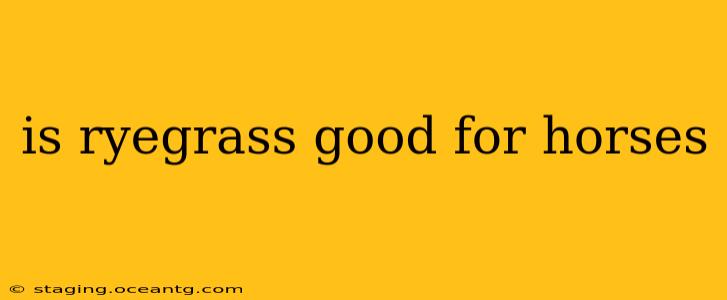Is Ryegrass Good for Horses? A Comprehensive Guide
Ryegrass, a cool-season grass known for its rapid growth and high yield, is a common sight in pastures worldwide. But is it a suitable forage for horses? The answer, as with many things concerning equine nutrition, is nuanced. While ryegrass can be a component of a healthy horse's diet, it's not without potential drawbacks. This guide will explore the pros and cons, helping you determine if ryegrass is the right choice for your equine companion.
What are the benefits of feeding ryegrass to horses?
Ryegrass offers several advantages when incorporated into a horse's diet as part of a balanced grazing regime:
- High Palatability: Horses generally find ryegrass palatable, readily consuming it. This makes it a useful component of a pasture mix, encouraging grazing and potentially reducing selective grazing of less desirable plants.
- High Nutritional Value (when young): Young, actively growing ryegrass is relatively rich in digestible energy and protein, providing valuable nutrients for horses, especially growing youngsters or those in moderate work. However, this nutritional value decreases significantly as the grass matures.
- Good Forage Source: Ryegrass provides bulk to the horse’s diet, promoting healthy digestion. This is particularly important for horses prone to colic or digestive upset. This, however, is contingent upon the health and maturity of the ryegrass itself.
What are the risks associated with feeding ryegrass to horses?
Despite its advantages, ryegrass presents several potential risks that horse owners must consider:
- Endophyte Toxins: Some ryegrass varieties contain endophyte fungi. These fungi produce toxins that can negatively impact horse health. Symptoms can vary widely depending on the type and concentration of toxins, but may include reduced appetite, poor growth, reproductive issues, and even neurological problems. The risk varies by the type of ryegrass and how it's managed. Choosing endophyte-free varieties is crucial.
- Nutritional Deficiency in Mature Ryegrass: As mentioned earlier, mature ryegrass loses its nutritional value, becoming lower in protein and digestible energy. Horses grazing on mature ryegrass alone may not receive adequate nutrition, leading to weight loss or other health issues.
- Risk of Laminitis: Ryegrass, especially when lush and rapidly growing, can contribute to the risk of laminitis (inflammation of the laminae in the hoof) due to its high sugar content, particularly fructans. This risk is heightened when horses consume large quantities of rapidly growing ryegrass, especially following periods of rain or drought.
- Potential for Bloat: Though less common than with other legumes, ryegrass can still contribute to bloat in susceptible horses, especially when consumed in large quantities or when combined with other high-risk forages.
What types of ryegrass are safe for horses?
Not all ryegrasses are created equal. Choosing endophyte-free varieties is paramount to minimizing the risk of toxin exposure. Consult with a veterinarian or equine nutritionist to determine the most suitable ryegrass variety for your horse's specific needs and your geographical location. They can advise on locally adapted varieties that are low in endophytes and manage to minimize the potential dangers of ryegrass for laminitis.
How much ryegrass should horses eat?
There's no single answer to this question, as the appropriate amount of ryegrass depends on the horse's age, weight, activity level, overall diet, and the nutritional content of the ryegrass itself. Always introduce ryegrass gradually to avoid digestive upset. Monitoring your horse’s weight, manure consistency, and overall health is crucial to ensure they are receiving adequate nutrition without overconsumption of ryegrass. A balanced diet that includes hay, a high-quality commercial feed (as needed), and other forages is essential.
Can ryegrass cause laminitis in horses?
Yes, ryegrass can contribute to the risk of laminitis, especially when it's lush and rapidly growing. The high sugar content, particularly fructans, can trigger laminitis in susceptible horses. Proper pasture management, including avoiding overgrazing and choosing endophyte-free varieties, can help minimize this risk. Regular hoof care and monitoring for any signs of laminitis are also vital.
Is it better to feed ryegrass or other types of grass to horses?
There's no universally "better" grass for horses. The ideal forage depends on factors such as climate, soil conditions, and the horse's individual needs. A diverse pasture mix, offering a range of grasses and legumes, is often the most beneficial approach, providing a balanced nutritional profile and reducing the risk associated with relying on a single forage source.
In conclusion, ryegrass can be a valuable component of a horse's diet when managed appropriately. However, awareness of its potential risks, careful selection of endophyte-free varieties, and responsible pasture management are crucial to ensure the health and well-being of your equine partner. Always consult with a veterinarian or equine nutritionist for personalized advice tailored to your horse's specific needs.
